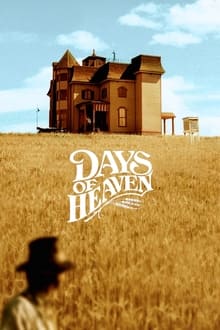
Following the story of Bill (Richard Gere), a hard working laborer in the early 19th century, Days Of Heaven is a cinematic masterpiece. Accompanied by his girlfriend, Abby (Brooke Adams) and sister (Linda Manz), Bill departs on a steam engine for a lone wheat farm in Texas for work. The journey is a long one, but director Terrence Malick makes the ride pleasant with beautiful shots of nature at its best. The rest of the movie follows suit. Although once at the farm the labor is arduous for the three characters, they find solace in being surrounded by the natural aesthetics. Everything is made even better when Bill, against his better judgment, convinces Abby to marry the owner of the farm. Life becomes carefree. The common thread that ties the film together is the depiction of nature. The plains of Texas are exactly that–plain. Malick is able to capture this simplicity and turn it into something extraordinarily beautiful. A common theme emerges–the relationship between humans and nature. At times the relationship can be a close one, as illustrated by the carefree frolicking through the fields. However at other times, by piecing together wide shots of the plains, Malick portrays humans as insignificant in comparison to nature. While the two are contrasts, the two work together to form a cohesive depiction of nature. This relationship is especially illuminated by the attempt to industrialize the farm. Steam engines and massive coal powered plows stand tall over the individual farmhands. One can look at these massive machines as an attempt for man to conquer nature and assert his dominance. Additionally, Malick is able to give nature emotion, almost as vivid as if it was an animate object. Wheat blowing back and forth in the wind while the sun shines through the clouds provides for a very melancholy and relaxed mood. The breeze is almost palpable on one’s cheek. Yet, when the massive machines arrive and the farmhands are forced to do intense manual labor, the calmness disappears. Life becomes hectic. This contrast shows the duality of nature. For every pleasant thing in life, there is a bad thing as its complement– much like heaven and hell. This is extremely apparent when Bill attempts to leave the farm for the second time. As he leaves the farmer’s residence, he hears a droning sound. Before Bill or the viewer understands what is happening, the sky opens up with locusts. The farm literally becomes engulfed in these insects coming straight out of the ten plagues. All hell breaks loose–sirens sound and hundreds of workers tried to get these locusts off the farm. All that is beautiful–the wheat, the sky, and the vast emptiness of the plains–is covered up. It is almost as if hell is covering the heaven on earth. This allegory becomes even clearer once a fire erupts. The days in heaven are clearly over as the fire cannot be contained and the beauty is physically destroyed. Following the duality in nature already established by the movie, heaven is subsequently restored. Although most of the crops are gone after the fire, the land still has an aesthetic quality to it. And although Bill and Abby never find solace after fleeing, Bill’s sister finds herself enjoying life again after reuniting with her friend. Just as it had been during the days of heaven, she is carefree again.